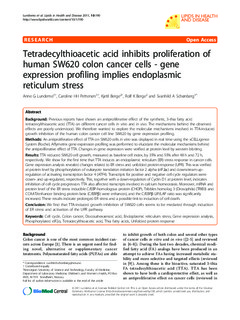| dc.contributor.author | Lundemo, Anne Gøril | |
| dc.contributor.author | Pettersen, Caroline Hild | |
| dc.contributor.author | Berge, Kjetil | |
| dc.contributor.author | Berge, Rolf Kristian | |
| dc.contributor.author | Schønberg, Svanhild Margrethe Arentz | |
| dc.date.accessioned | 2019-10-11T11:32:06Z | |
| dc.date.available | 2019-10-11T11:32:06Z | |
| dc.date.created | 2011-12-15T09:17:38Z | |
| dc.date.issued | 2011 | |
| dc.identifier.citation | Lipids in Health and Disease. 2011, 10 . | nb_NO |
| dc.identifier.issn | 1476-511X | |
| dc.identifier.uri | http://hdl.handle.net/11250/2621608 | |
| dc.description.abstract | Background
Previous reports have shown an antiproliferative effect of the synthetic, 3-thia fatty acid tetradecylthioacetic acid (TTA) on different cancer cells in vitro and in vivo. The mechanisms behind the observed effects are poorly understood. We therefore wanted to explore the molecular mechanisms involved in TTA-induced growth inhibition of the human colon cancer cell line SW620 by gene expression profiling.
Methods
An antiproliferative effect of TTA on SW620 cells in vitro was displayed in real time using the xCELLigence System (Roche). Affymetrix gene expression profiling was performed to elucidate the molecular mechanisms behind the antiproliferative effect of TTA. Changes in gene expression were verified at protein level by western blotting.
Results
TTA reduced SW620 cell growth, measured as baseline cell index, by 35% and 55% after 48 h and 72 h, respectively. We show for the first time that TTA induces an endoplasmic reticulum (ER) stress response in cancer cells. Gene expression analysis revealed changes related to ER stress and unfolded protein response (UPR). This was verified at protein level by phosphorylation of eukaryote translation initiation factor 2 alpha (eIF2α) and downstream up-regulation of activating transcription factor 4 (ATF4). Transcripts for positive and negative cell cycle regulators were down- and up-regulated, respectively. This, together with a down-regulation of Cyclin D1 at protein level, indicates inhibition of cell cycle progression. TTA also affected transcripts involved in calcium homeostasis. Moreover, mRNA and protein level of the ER stress inducible C/EBP-homologous protein (CHOP), Tribbles homolog 3 (Drosophila) (TRIB3) and CCAAT/enhancer binding protein beta (C/EBPβ) were enhanced, and the C/EBPβ LIP/LAP ratio was significantly increased. These results indicate prolonged ER stress and a possible link to induction of cell death.
Conclusion
We find that TTA-induced growth inhibition of SW620 cells seems to be mediated through induction of ER stress and activation of the UPR pathway. | nb_NO |
| dc.language.iso | eng | nb_NO |
| dc.publisher | BMC (part of Springer Nature) | nb_NO |
| dc.rights | Navngivelse 4.0 Internasjonal | * |
| dc.rights.uri | http://creativecommons.org/licenses/by/4.0/deed.no | * |
| dc.title | Tetradecylthioacetic acid inhibits proliferation of human SW620 colon cancer cells - gene expression profiling implies endoplasmic reticulum stress | nb_NO |
| dc.type | Journal article | nb_NO |
| dc.type | Peer reviewed | nb_NO |
| dc.description.version | publishedVersion | nb_NO |
| dc.subject.nsi | VDP::Medisinsk molekylærbiologi: 711 | nb_NO |
| dc.subject.nsi | VDP::Medical molecular biology: 711 | nb_NO |
| dc.source.pagenumber | 11 | nb_NO |
| dc.source.volume | 10 | nb_NO |
| dc.source.journal | Lipids in Health and Disease | nb_NO |
| dc.identifier.doi | 10.1186/1476-511X-10-190 | |
| dc.identifier.cristin | 868289 | |
| dc.description.localcode | © 2011 Lundemo et al; licensee BioMed Central Ltd. This is an Open Access article distributed under the terms of the Creative Commons Attribution License (http://creativecommons.org/licenses/by/2.0), which permits unrestricted use, distribution, and reproduction in any medium, provided the original work is properly cited. | nb_NO |
| cristin.unitcode | 194,65,15,0 | |
| cristin.unitname | Institutt for klinisk og molekylær medisin | |
| cristin.ispublished | true | |
| cristin.fulltext | original | |
| cristin.qualitycode | 1 | |

